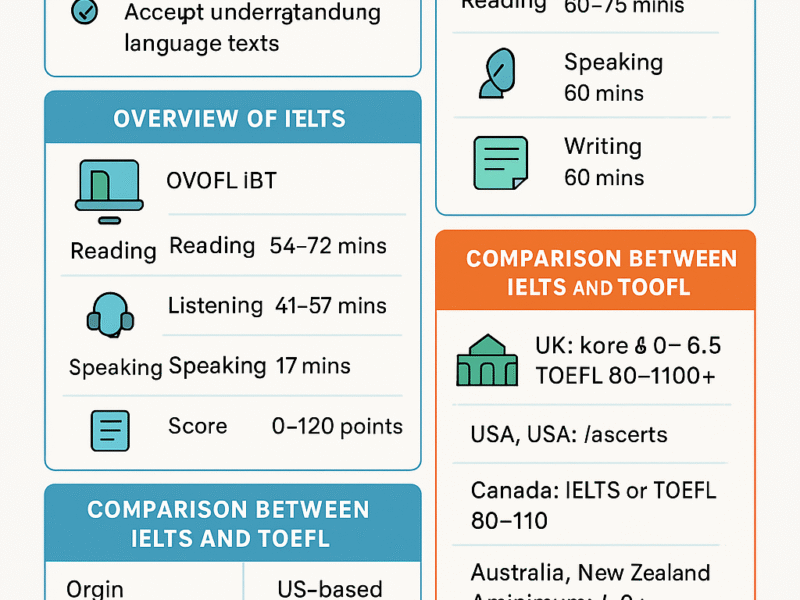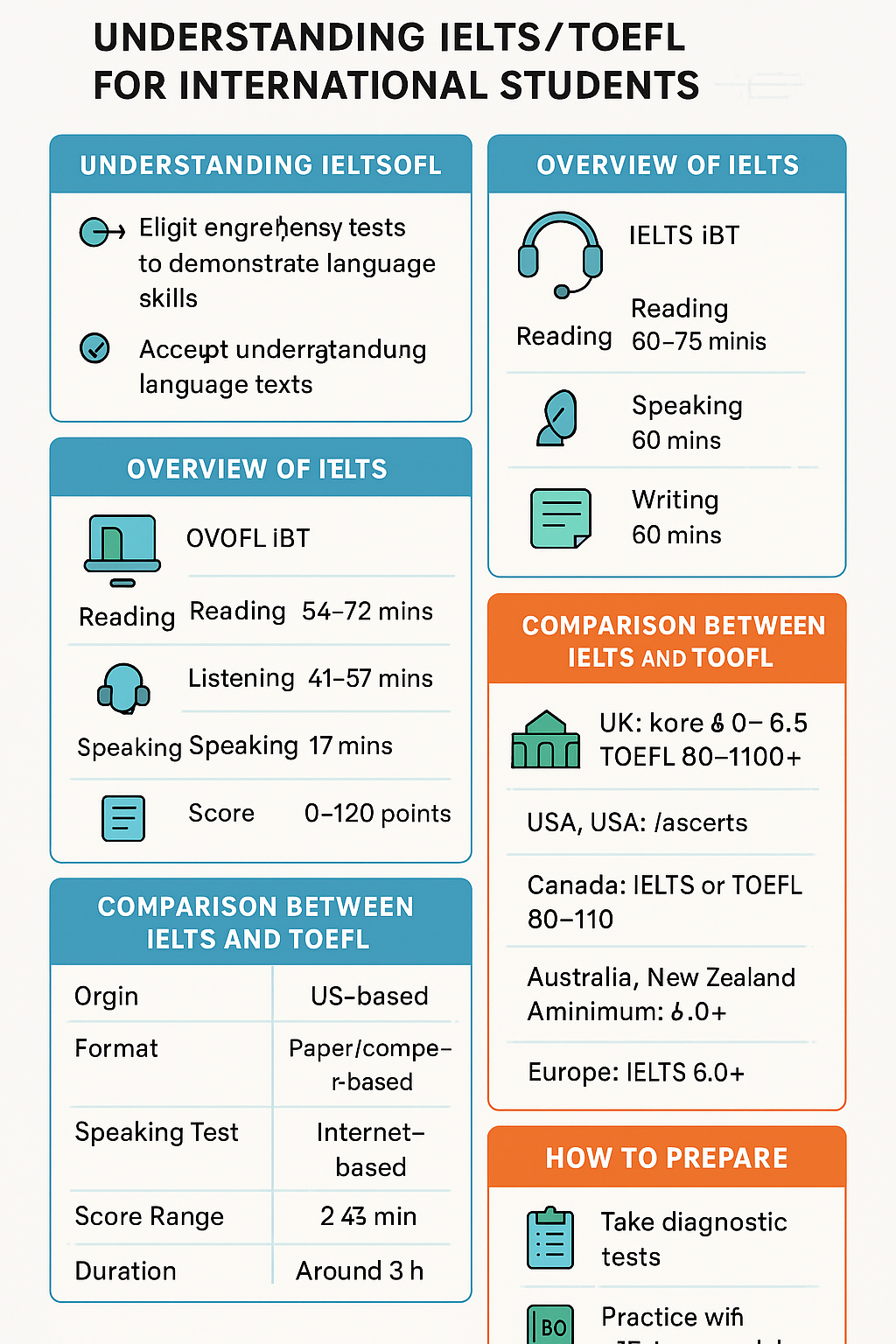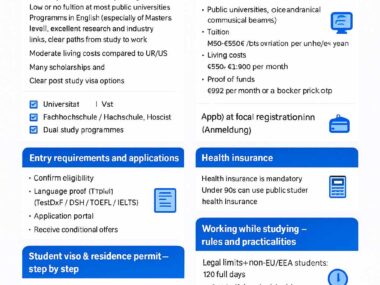IELTS/TOEFL REQUIREMENTS FOR INTERNATIONAL STUDENTS
In an increasingly globalized world, education has transcended borders. Every year, millions of students leave their home countries in pursuit of quality education abroad. However, before embarking on their international academic journey, students from non-English-speaking countries are often required to demonstrate their proficiency in the English language. Two of the most widely accepted standardized tests for this purpose are the IELTS (International English Language Testing System) and TOEFL (Test of English as a Foreign Language).
Both tests assess the ability of non-native speakers to use and understand English in an academic setting. This write-up explores the purpose, structure, differences, preparation, scoring systems, university-specific requirements, visa implications, and other critical aspects of IELTS and TOEFL requirements for international students.
Understanding the Purpose of IELTS and TOEFL
English language proficiency tests serve as gateways for international students to gain admission to universities and colleges in countries where English is the medium of instruction. These tests ensure that students can:
- Understand academic lectures and discussions
- Participate in seminars and group work
- Write academic essays and reports
- Read academic texts and journals
Inadequate language skills may hinder academic performance, which is why universities insist on these standardized assessments.
Overview of IELTS
What is IELTS?
The International English Language Testing System (IELTS) is jointly managed by the British Council, IDP: IELTS Australia, and Cambridge Assessment English. It is accepted by over 11,000 organizations globally, including universities, employers, immigration authorities, and professional bodies.
IELTS Versions
There are two versions:
- IELTS Academic—for students seeking higher education
- IELTS General Training—for migration, work, or training programs
International students typically take the academic module.
Test Format
The IELTS Academic test comprises four sections:
| Section | Duration | Description |
|---|---|---|
| Listening | 30 mins | 4 recorded monologues and conversations |
| Reading | 60 mins | 3 long texts from academic sources |
| Writing | 60 mins | 2 tasks: a description (Task 1) and an essay (Task 2) |
| Speaking | 11-14 mins | Face-to-face interview with an examiner |
Scoring
Each section is scored on a band scale of 0–9, and the average of the four gives the overall band score. Universities usually require scores between 6.0 and 7.5, depending on the course and institution.
Overview of TOEFL
What is TOEFL?
The Test of English as a Foreign Language (TOEFL) is developed and administered by ETS (Educational Testing Service), USA. It is predominantly accepted in North America but is also widely recognized in Europe, Asia, and Australia.
TOEFL Versions
- TOEFL iBT (Internet-Based Test) – the most common version
- TOEFL Paper-Based Test (PBT) – less common and available in locations with limited internet access
Test Format (TOEFL iBT)
The test consists of four sections:
| Section | Duration | Description |
|---|---|---|
| Reading | 54–72 mins | 3–4 passages with questions |
| Listening | 41–57 mins | Lectures and conversations |
| Speaking | 17 mins | 4 tasks requiring spoken responses |
| Writing | 50 mins | 2 tasks: integrated and independent writing |
Scoring
Each section is scored out of 30, for a total of 120 points. Universities generally require scores between 80 and 110 for undergraduate and graduate programs.
Comparison Between IELTS and TOEFL
| Criteria | IELTS | TOEFL |
|---|---|---|
| Origin | UK-based | US-based |
| Format | Paper- or Computer-based | Internet-based |
| Speaking Test | Face-to-face with examiner | Recorded responses |
| Score Range | 0–9 band | 0–120 points |
| Duration | 2 hours 45 minutes | Around 3 hours |
| Frequency | Multiple times a month | Over 60 test dates/year |
| Accepted In | UK, Europe, Australia, Canada | US, Canada, Australia, Europe |
| Writing Task | Academic writing + essay | Integrated and independent |
Which to Choose?
- IELTS is preferable if applying to the UK, Australia, or New Zealand
- TOEFL is ideal for universities in the USA and Canada
- Consider your strengths: if you’re more comfortable with speaking to a person, IELTS may be better; if you prefer typing and computer-based tests, TOEFL might suit you.
University and Country-Specific Requirements
United Kingdom
- Undergraduate programs typically require an IELTS Academic score of 6.0–6.5
- Postgraduate courses may require 6.5–7.5
- TOEFL scores of 80–100+ are also accepted by many UK universities
- The UKVI IELTS is required for certain visa types
United States
- Most universities accept TOEFL iBT (80–100+)
- An increasing number of institutions now accept IELTS (6.5–7.5)
- Ivy League schools may require higher scores
Canada
- Both IELTS and TOEFL are accepted
- Minimum requirement: IELTS 6.0–6.5, TOEFL 80–100
- Some colleges require higher speaking and writing scores
Australia & New Zealand
- IELTS is more commonly accepted
- Required scores: 6.0–7.0 for IELTS, 80–100 for TOEFL
- IELTS is often required for visa applications
Europe
- Non-English speaking countries like Germany, France, and the Netherlands accept both tests
- English-taught programs often require IELTS 6.0+ or TOEFL 80+
Visa Implications
UK Student Visa (Tier 4)
- Requires IELTS for UKVI if applying below degree level
- Universities listed under the Student Route can issue CAS letters based on TOEFL or regular IELTS results
USA Student Visa (F1)
- Must show acceptance into SEVP-certified school
- TOEFL/IELTS score is part of admission documentation
Canada Study Permit
- Proof of language proficiency accepted through IELTS Academic or TOEFL iBT
- A language score report required during visa process
Australia Student Visa
- IELTS is often required to prove language ability
- TOEFL iBT scores are accepted as well
How to Prepare for IELTS/TOEFL
Preparation Steps
- Understand the format: Familiarize yourself with each section
- Take diagnostic tests: Assess your current level
- Use official materials: Practice with books and sample papers from ETS or British Council
- Practice speaking: IELTS requires interpersonal communication; TOEFL uses recorded responses
- Improve vocabulary and grammar: Essential for writing and speaking tasks
- Seek professional help: Consider online or in-person coaching
Recommended Resources
- IELTS: Cambridge IELTS Books, IELTS Liz, British Council’s Road to IELTS
- TOEFL: The Official Guide to the TOEFL Test, Magoosh, ETS Practice Tests
Common Myths About IELTS/TOEFL
- “IELTS is easier than TOEFL”—It ”depends on the student’s skills and preferences.
- “You can’t take the test more than ”once”—you can take either test multiple times.
- “Only native speakers can score high”—many non-native speakers achieve perfect scores through practice.
- “TOEFL is only accepted in the ”USA”—TOEFL is accepted in over 150 countries.
- “IELTS is only useful for studying in the ”UK”—IELTS is widely accepted in Canada, Australia, and parts of the US.
Fees and Validity
| Test | Fee (approx.) | Validity |
|---|---|---|
| IELTS | $245–$265 | 2 years |
| TOEFL | $190–$240 | 2 years |
- Fees may vary depending on the country and test center
- Always check with the official test providers for up-to-date information
Alternatives to IELTS/TOEFL
Some universities accept alternatives such as:
- Duolingo English Test
- PTE Academic (Pearson Test of English)
- Cambridge English Qualifications (C1 Advanced or C2 Proficiency)
- SAT/ACT English section (some US schools)
However, IELTS and TOEFL remain the most universally recognized tests.
Tips to Maximize Your Score
- Time Management: Practice completing each section within the allotted time
- Simulate Exam Conditions: Take full-length mock tests
- Record Yourself: For TOEFL speaking practice
- Seek Feedback: From qualified English instructors
- Avoid Memorization: Use natural language and structured arguments
- Review Mistakes: Learn from incorrect answers in practice tests
Conclusion
Both IELTS and TOEFL are essential tools for international students who dream of studying abroad. Your choice of test should depend on the destination country, university requirements, personal test-taking style, and convenience. These language proficiency tests not only serve as academic prerequisites but also play a significant role in visa applications and future job opportunities.
Preparing for IELTS or TOEFL is an investment in your future. With the right strategies, resources, and dedication, international students can meet and exceed the language requirements for their chosen institutions, paving the way for academic success and global opportunities.
![]()







2 comments